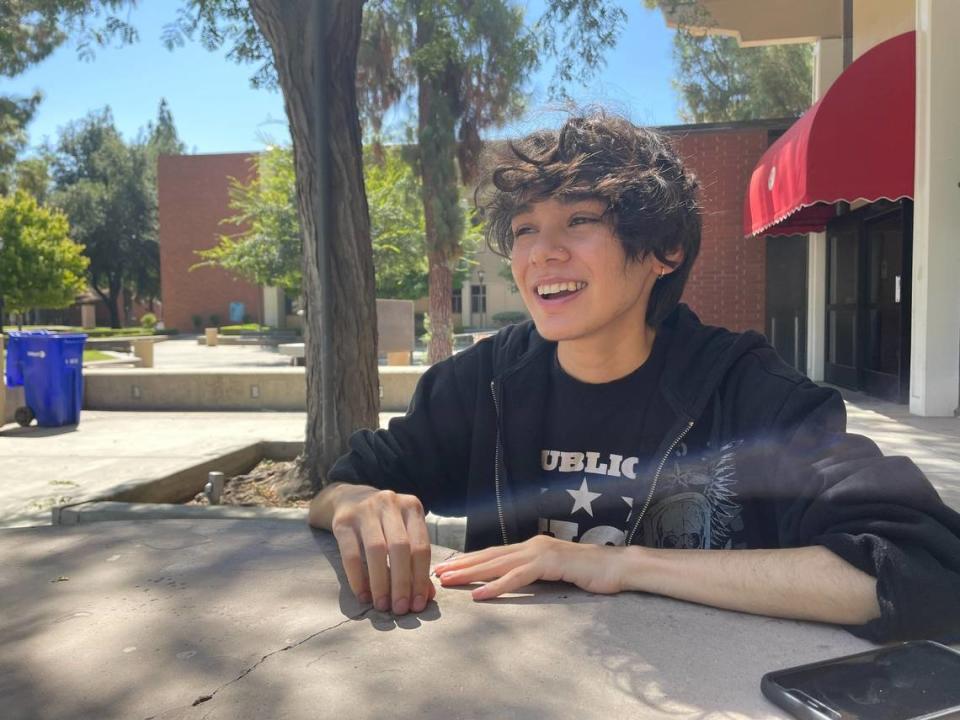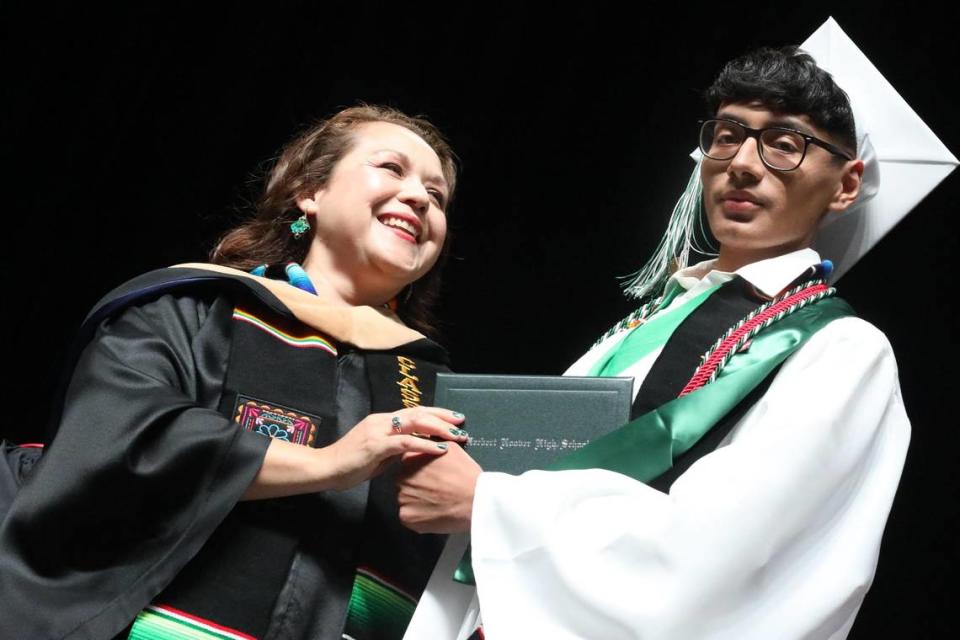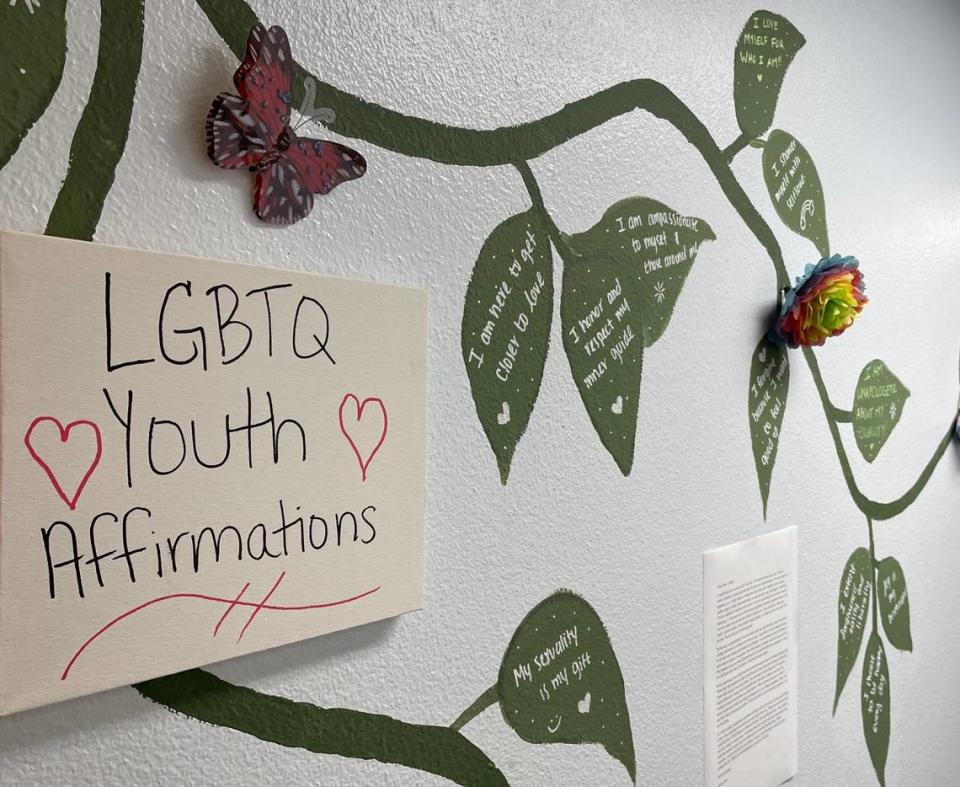‘This is life or death.’ California teens say transgender outing policies threaten safety
Fresno resident Ashens Limon realized he was queer at 10 years old.
At first, he didn’t tell anyone at school. He didn’t tell anyone at home, either, since he grew up in a religious, Latino household.
Instead, Limon resorted to online communities to connect and find fellow LGBTQ youth. But he struggled with feelings of loneliness through his identity exploration.
Over time, Limon’s mental health took a dangerous turn.
As a 10 year old, Limon tried to take his own life and ended up in the hospital – a situation that forced him to come out to his mom and seek mental health support.
“It was very isolating,” he said of his experience navigating his identity without supportive adults.
Limon – now a transgender 18-year-old male and anthropology student – finds support in therapy, in his tight-knit community at the Fresno LGBTQ Youth Alliance and at a gender-affirming school campus environment at Fresno City College.

Limon’s experience with suicide is not uncommon.
A 2020 report by the Trevor Project, a nonprofit dedicated to suicide prevention among LGBTQ youth, found that Latinx LGBTQ youth are more than four times as likely to report attempting suicide in the past year compared to straight/cisgender peers, and 30% more likely to report a suicide attempt in the past year compared to non-Latinx LGBTQ youth.
A growing number of California school districts — such as Chino Valley, Rocklin and Orange unified school districts — are implementing policies requiring district staff to inform a student’s parents if their child requests to change their name, gender expression, or pronouns , or if students request access to sex-segregated school programs and activities, or bathrooms or changing facilities that do not align with the child’s biological sex or gender.
Parents who support these notification policies argue that it’s their right to know about all aspects of their child’s development. But California Attorney General Rob Bonta argues that the policies threatens students’ civil rights and educational opportunities, and harm their safety and well-being. Last week, a California judge put a pause on Chino Valley Unified School District’s new policy after Bonta filed a legal challenge against the district.
Still, Limon fears the rise of these policies will endanger the health and even the lives of LGBTQ youth.
“There’s so much danger coming to young trans people,” he said.
Transgender youth often experience mental and sometimes physical abuse after their parents find out about their identities, Limon said, not to mention transgender youth already experience disproportionate rates of suicide.
“This isn’t just a matter of identity,” he said, “this is life or death for a lot of young people.”
La Abeja, a newsletter written for and by California Latinos
Sign up here to receive our weekly newsletter centered around Latino issues in California.
School is safe place for gender expression
Oftentimes, school is the only safe place for students to express their gender identity, according to Joseph Aquino, a recent Hoover High School graduate and former Fresno Unified School District student board member.
“A lot of my friends and former classmates express themselves authentically within a classroom environment and it’s such a beautiful thing to see,” Aquino said. “But it’s also an ugly thing to see them go back into their shell once they leave the gates of their campus because they are afraid to be who they are in front of their family who may not accept them,” he added.
Aquino, 18, now a Fresno State political science student, knows how this feels firsthand.
As a gay teenager whose identity wasn’t always supported among his Latino family, he found refuge in the “overwhelming love and support” of a school staffer.
“My campus culture director saved me in a way,” Aquino said.
Aquino said the rise of these parent notification policies in places like Chino Valley and potentially in the nearby Clovis Unified is “really scary.” During a school board meeting last week, more than 20 Clovis parents and others demanded the district create a written policy to notify parents when students at school decide to change their pronouns, names and gender identity.
Aquino said these policies threaten the feeling of safety for LGBTQ youth on school campuses – especially when home life doesn’t always feel welcoming.

“Our schools can be (LGBTQ students’) only source of them feeling themselves,” Aquino said.
A June 2023 survey of Gen Z youth conducted by Blue Shield of California/Harris Poll found that 26% of transgender youth, and 42% of non-binary youth rated their mental health as “poor,” while 61% of California Gen Z youth polled said they are concerned about discrimination against LGBTQ community.
And the rise of these policies appears to play a role in worsening the mental health of LGBTQ youth.
Nearly 1 in 3 LGBTQ young people ages 13 to 24 said their mental health was poor most of the time or always due to anti-LGBTQ policies and legislation, according to a separate nationwide poll by the Trevor Project.
Instead of discriminatory policies, Aquino said schools should focus on supporting students through counseling and mental health resources.

‘This is all going to be obsolete’
Jennifer Cruz, Fresno Economic Opportunities Commission’s LGBTQ+ Resource Center Manager, works everyday with young LGBTQ people grappling with their mental health.
Young people – from teens to early 30s – are vulnerable to rejection from their family, friends, extended family, Cruz said, which can have a huge impact on their mental health.
“They feel ashamed, they’re rejected, they don’t have any resources to help themselves and then what’s left?,” she said in an Aug. 7 interview with The Bee. “They just get hopeless.”
To address these challenges, the center has mental health professionals on site. But there’s still a need for more gender-affirming mental health care in the Central Valley, Cruz said, especially after the pandemic caused a lot of anxiety and depression in young people.

Another challenge for LGBTQ youth and families is around religious beliefs, or what Cruz calls “religious trauma.” Some parents, she added, “are genuinely afraid that their young person’s soul is doomed for eternity – ‘we’re not going to be reunited in the afterlife,’ kind of thing.”
Limon, for example, was sent to a Christian counselor, forced to sit through weekly anti-LGBTQ Sunday sermons and told he was going to hell by his mother.
“Having your family tell you that they think that you’re going to go to a bad place and they aren’t because of just who you are…just sucks to hear,” he said.
For parents who are open to learning how to support their child, however, the LGBTQ+ Resource Center connects people with faith leaders from the several LGBTQ-affirming churches in Fresno such as the Big Red Church or the Unitarian Universalist Church of Fresno, Cruz said.
In the meantime, the center is working to help organize Gay-Straight Alliance clubs in more Central Valley schools, such as in Central, Clovis and Sanger unified school districts.
While they’re both concerned about the proliferation of parent notification policies in schools, Limon and Aquino both say they find hope in younger generations being more open and tolerant towards the LGBTQ community.
“In the future,” Limon said, “this is all going to be obsolete.”
I f you or someone you know needs support now, call or text 988 or chat at 988lifeline.org.
This is part of a series on Stop The Hate, a project funded by the California State Library.
Coming out in Fresno: For queer Latinos, supportive families are ‘bigger than everything’
Protecting a diverse city from hate crimes a priority for Fresno mayor
Hugo Morales: “If you’re indígena in the Americas, you’re discriminated against and by many people”
The hateful signs may have disappeared, but racist attitudes haven’t | Opinion
Task force to tackle growing problem of hate crime in the greater Fresno area
Fresno police chief: Low reports of hate crime don’t tell the whole story

